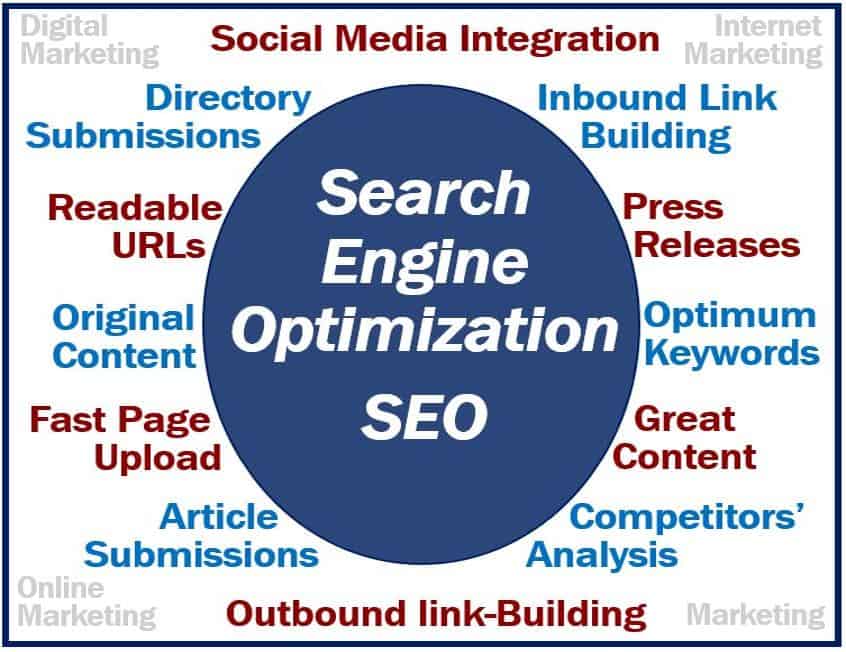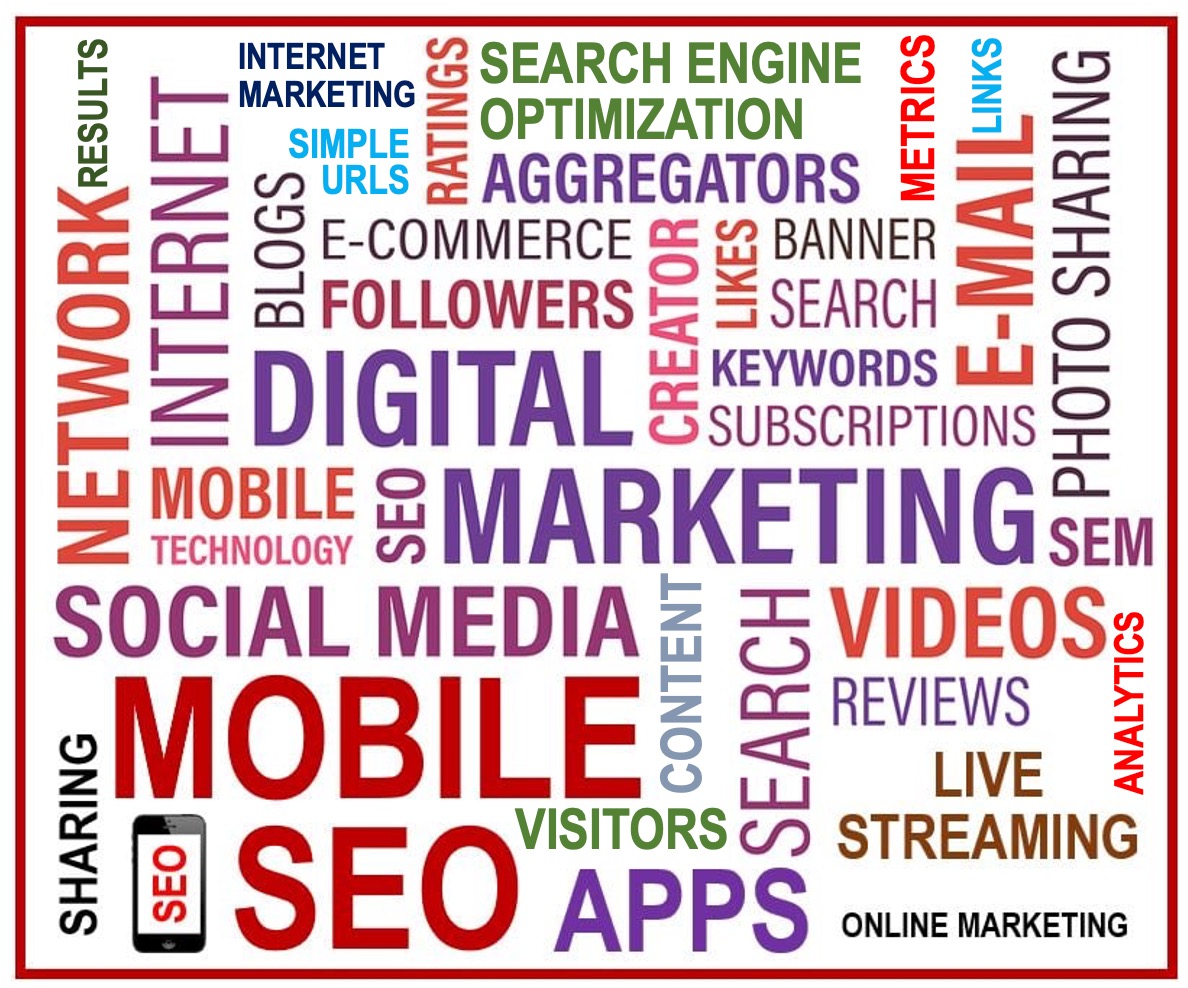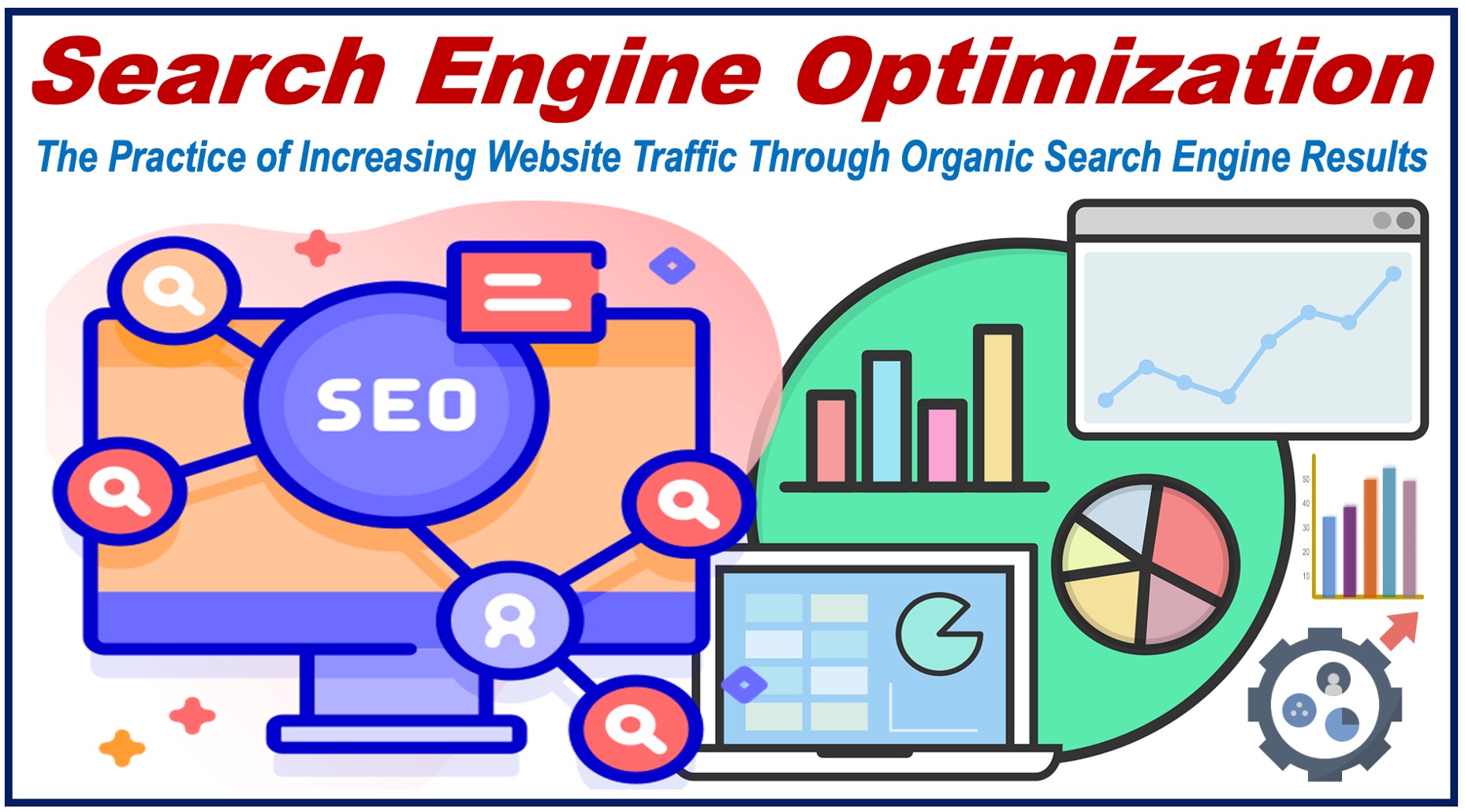What is search engine optimization or SEO? Definition and examples
SEO means trying to improve how high up a website appears in a search result when somebody uses a search term on a search engine. SEO stands for Search Engine Optimization.
Let’s suppose somebody searches in Google using the search term ‘banana split.’ You see that your webpage, www.acme.com/bananasplit/, appears first in the search results. This means that your webpage is very well optimized for the search term ‘banana split.’
SEM or search engine marketing has the same aim, i.e., improve one’s presence in search engines and thus get more traffic. However, unlike SEO, with SEM the marketer pays for advertising in the search engines.
Website’s search engine ranking
Put simply, SEO means trying to get a webpage to appear first when somebody searches on a search engine. Search engines give webpages and websites rankings. The higher your ranking, the nearer to the top your webpage will appear when somebody places a relevant search.
We can write the word ‘webpage’ as one or two words, i.e., ‘webpage’ or ‘web page.’
A search engine is a software system that allows Internet users to search for content via the World Wide Web. Google, Yahoo, Safari, and Bing, for example, are search engines.
According to Daniel Foley, a British freelance SEO consultant:
“SEO or search engine optimization is all about getting your website at or near the top of search engine results. The nearer the top you are, the more successful you will be.”
In this context, ‘organic’ means ‘unpaid.’ In other words, if a webpage comes top with a search term, it did so because the search engine thinks it is the best choice. It did not come top because it paid the search engine.

For effective SEO great content is king
If a website has great content, people are more likely to link to its webpages. Search engines notice the number of links to your website. The more links there are pointing to your website, the more search engines like Google will take note.
Search engines want to show authoritative and interesting webpages when people submit a search term. If lots of websites link to yours, search engines will rank it higher.
Therefore, an important goal in SEO is to get lots of people to link to your site.
Regarding having great content, Red Revolution says:
“Google™ promotes authority pages to the top of its rankings so it’s your job to create pages that become authority pages.”
“This involves writing content people find useful because useful content is shared in blogs, twitter feeds etc., and over time Google™ picks up on these authority signals.”
Many Internet marketing professionals say that search engine rankings is simply quality control for webpages and websites. Internet marketing is marketing that just occurs online.

Important SEO tips
-
Page load time
Slow speed is a killer. Remove anything that slows down your webpage(s). Niel Patel warns that a one-second delay in page load time can reduce conversions by 7%.
-
Keywords or key phrases
The focus keyphrase or keyword is the term that you want your webpage to rank the most in search engines. When people search in, for example, Google for that phrase, your page should appear at or near the top of the search results. Make sure you use a keyword that people use in Google, Yahoo, and other search engines.
You also need to be careful that your keyword density is not too high or too low. In other words, don’t place too many or too few of them. The density should not be above 3% or below 0.5%. Therefore, if your article contains 600 words, the keyword or keyphrase should appear between 3 and 18 times.
Yoast.com says the following about keywords and keyphrases:
“Make sure you use your focus keyphrase enough throughout the whole text. At the same time, don’t overdo it.”
“You don’t want Google to think you’re stuffing your text with keywords, as that’s frowned upon. If your keyphrase density is too low: add your focus keyphrase into your text more often.”
-
Linking
Whenever possible and relevant, link to other authoritative webpages. Do not worry about visitors clicking on the link and leaving your website. Some might do that and leave, but the benefits of having the link far outweigh the harms of some visitors leaving.
Link-building is a fundamental part of a successful and effective SEO strategy.
If your webpages link out, search engines will see them as more valuable resources. However, you must be selective. The link must be to somewhere that enhances the visitor’s online experience.
-
Simple URLs
Your URL must not be cluttered up and difficult to understand. The simpler and more ‘readable’ it is, the easier it will be for search engines to understand it and know what to do.
URL, which stands for Uniform Resource Locator, is the address of your webpage. It usually begins with ‘http’ or ‘https’ and sometimes also the letters ‘www.’
Here are two URLs. Look at them, and then answer the question below them.
- https://acme.com/ssste11block-szzz888stritst/stingoringoblzz/
- https://acme.com/new-drone-replace-passenger-cars/
Which one is simpler and more readable? In other words, which one clearly tells you what the webpage is about? It is obviously the second one. For good SEO, aim for URLs like the second one.
-
Encourage good websites to link to yours
The more inbound links you have, the better the search engines will rank your site, according to the experts at SEOlutions. However, the links must come from authoritative websites. In other words, good websites.
A link from a prestigious university, government department, or teaching hospital, for example, is worth gold. Let’s suppose you have written an article about certain types of diabetes treatments. Then, the country’s top teaching hospital’s website links to your article. Search engines will notice that. When somebody searches for, for example, ‘diabetes treatments,’ your webpage will come nearer the top thanks to the hospital’s link.
A link from a prestigious website might not get you to the very top of a search result. There are many other factors that search engines consider. However, that link will push you up the search results ladder. Inbound links are crucial for effective SEO.
-
Original content
Let’s suppose you publish news on your website. A company, ACME Drones Inc., sends you a press release. It is about a new drone that might replace the private passenger car. That is incredibly interesting news.
If you copy and paste that press release and publish it, it probably won’t do well. Search engines do not like ‘duplicate content.’ In other words, they don’t like an article that has exactly the same wording and layout in another article on another website.
You will need to re-write that press release in your own words. Even better, you could add some relevant information that the press release does not mention. You could telephone ACME Drones and try to talk to the person who designed or is testing the new drone.
Most importantly, remember that search engines do not like ‘copy-and-paste’ articles! They are the kiss of death for a website’s ranking.
In addition to avoiding duplicate content, regularly updating your website with fresh, unique material can significantly boost its search engine rankings, as search engines favor websites that offer new and relevant information.
-
Focus on content more than search engines
Sometimes, we can get carried away with what the search engines want. Remember that your visitors are human beings. Therefore, what you place on your webpages must be primarily for humans.
If, for example, you are writing a news article, write for the people who will be reading it. Of course, you should also bear in mind what search engines are looking for. However, search engine criteria must take second place.
Additionally, engaging and user-friendly content not only satisfies visitors but also encourages them to share and link back to your site, further enhancing SEO through natural, organic growth.

SEO vocabulary and concepts
There are many compound nouns containing the term SEO. A compound noun consists of two or more words. Let’s take a look at some of them, their meanings, and how we can use them in a sentence:
-
SEO Strategy
A comprehensive plan to improve a website’s search engine rankings.
Example: “Their SEO strategy focused on optimizing content and improving user experience.”
-
SEO Audit
An evaluation process to assess the search engine optimization aspects of a website.
Example: “The SEO audit revealed numerous opportunities for improving our site’s visibility.”
-
SEO Analytics
The process of collecting and analyzing data related to a website’s search engine performance.
Example: “Using SEO analytics, they could track the effectiveness of their keywords.”
-
SEO Optimization
The act of making changes to a website to improve its ranking on search engines.
Example: “SEO optimization led to a significant increase in organic traffic.”
-
SEO Tool
A software application or online resource used for search engine optimization tasks.
Example: “They used an SEO tool to identify the best keywords for their articles.”
-
SEO Consultant
An expert who provides professional advice on search engine optimization.
Example: “The SEO consultant recommended several changes to enhance the website’s ranking.”
-
SEO Metrics
Quantitative measures used to assess and guide search engine optimization efforts.
Example: “They regularly reviewed SEO metrics to gauge the success of their content strategy.”
Two Videos
These two interesting video presentations, from our sister YouTube channel – Marketing Business Network, explain what ‘Search Engine Optimization (SEO)’ and ‘Search Engine’ are using simple, straightforward, and easy-to-understand language and examples.
-
What is SEO (Search Engine Optimization)?
-
What is a Search Engine?

